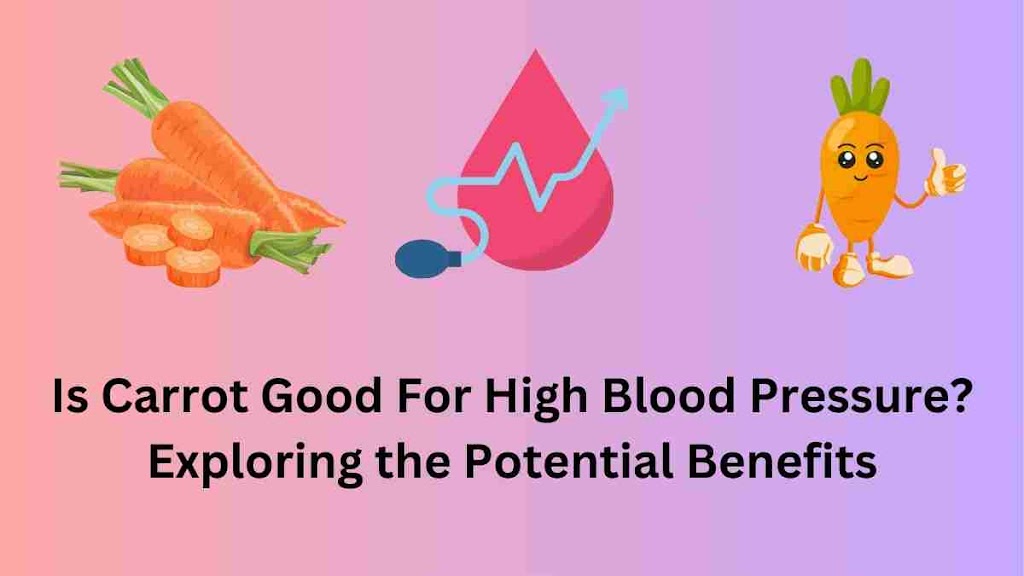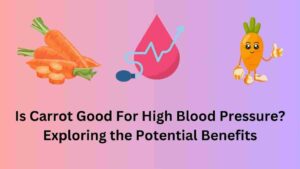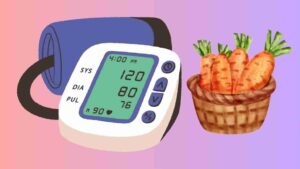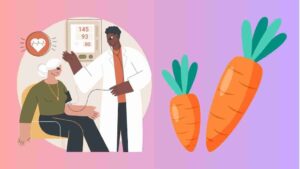Is Carrot Good for High Blood Pressure? High blood pressure, also known as hypertension, affects millions of people worldwide and is a leading cause of heart disease, stroke, and other health conditions. Finding natural remedies that can help lower blood pressure is of utmost importance, and one such remedy that has gained attention is the humble carrot. But the question remains, is carrot good for high blood pressure? Let’s delve deeper into the nutritional benefits of carrots and their potential impact on blood pressure levels.
Is Carrot Good For High Blood Pressure?
Yes, carrots are good because they have potassium and magnesium. These nutrients can relax the walls of your arteries, which helps to lower blood pressure.
Benefits of Carrots for High Blood Pressure
Nutritional Composition Of Carrots
Carrots are packed with a wide array of nutrients that make them a valuable addition to a diet aimed at managing high blood pressure. These vibrant orange vegetables are rich in essential vitamins and minerals such as vitamin A, vitamin K, vitamin C, potassium, and fiber.
Carrots And Blood Pressure Regulation
Including carrots in your diet can contribute to the regulation of blood pressure levels. The high potassium content in carrots helps to counterbalance the negative effects of sodium, a mineral that is often associated with elevated blood pressure. Potassium acts as a natural diuretic, promoting the elimination of excess sodium from the body through urine, thereby reducing the overall fluid volume and in turn, lowering blood pressure. In addition, carrots are a good source of dietary fiber, which plays a crucial role in maintaining healthy blood pressure levels. Fiber helps to control cholesterol levels by reducing the absorption of cholesterol in the gut. By reducing overall cholesterol levels and preventing the buildup of plaque in the arteries, carrots contribute to the prevention of hypertension.
Carotenoids And Their Impact On Hypertension
One of the key components of carrots that contribute to their beneficial effects on high blood pressure is the presence of carotenoids. Carotenoids are a group of pigments that give carrots their vibrant color. These compounds, such as beta-carotene, lutein, and zeaxanthin, possess potent antioxidant properties, which help to combat oxidative stress and inflammation, both of which are linked to high blood pressure and other cardiovascular diseases. Research suggests that the consumption of carotenoid-rich foods, including carrots, may help to lower blood pressure levels. Studies have shown that individuals with a higher intake of carotenoids had lower blood pressure readings and a reduced risk of developing hypertension.
Other Health Benefits of Carrots
Carrots And Cardiovascular Health
Carrots, often known for their vivid orange color, are not only a delicious addition to your meals but also an excellent source of nutrients that can promote cardiovascular health. Here are some specific ways in which carrots can benefit your heart health:
1. Regulating Blood Pressure
Carrots contain a compound called potassium, which is known to help maintain healthy blood pressure levels. Regular consumption of carrots can contribute to the overall reduction in the risk of hypertension or high blood pressure, a condition that increases the risk of cardiovascular diseases.
2. Lowering Cholesterol Levels
Studies have shown that carrots can help reduce cholesterol levels in the body. High levels of cholesterol, particularly LDL or “bad” cholesterol, can lead to the development of plaque in the arteries, increasing the risk of heart disease. Incorporating carrots into your diet can aid in keeping cholesterol levels in check and promoting a healthy heart.
3. Promoting Heart-Healthy Antioxidants
Carrots are rich in antioxidants such as beta-carotene, which can help protect the heart and blood vessels from oxidative stress. Antioxidants act as scavengers, neutralizing harmful free radicals that can cause damage to cells and contribute to the development of cardiovascular diseases.
Carrots And Eye Health
Carrots have long been associated with promoting good vision and maintaining overall eye health. Here are some of the ways in which carrots can benefit your eyes:
1. Improving Night Vision
Carrots are well-known for their high content of beta-carotene, which is converted into vitamin A in the body. Adequate levels of vitamin A are essential for optimal eye function, particularly in low-light conditions. Consuming carrots regularly can help improve night vision and reduce the risk of night blindness.
2. Protecting Against Age-Related Macular Degeneration (AMD)
AMD is a common eye condition that primarily affects older adults, leading to the deterioration of the macula, a part of the retina responsible for central vision. The antioxidants present in carrots, including beta-carotene, lutein, and zeaxanthin, have been shown to reduce the risk of developing AMD and slow its progression.
3. Preventing Dry Eyes
Carrots also contain a significant amount of vitamin C, which plays a crucial role in maintaining the health of the blood vessels in the eyes. Consuming an adequate amount of vitamin C-rich foods like carrots can help prevent dry eyes, a common condition that can cause discomfort and vision problems.
Carrots And Cancer Prevention
In addition to promoting cardiovascular health and supporting eye health, carrots have also been linked to potential cancer prevention. Here’s how carrots can contribute to reducing the risk of certain cancers:
1. Protective Effects Against Lung Cancer
Research suggests that consuming carrots regularly may help reduce the risk of lung cancer, particularly in smokers. The antioxidants found in carrots, such as beta-carotene, have been associated with a lower incidence of lung cancer and may have protective effects against the harmful effects of tobacco smoke.
2. Reduced Risk of Colorectal Cancer
Carrots are rich in dietary fiber, which plays a crucial role in maintaining a healthy digestive system. Adequate fiber intake has been associated with a lower risk of developing colorectal cancer. Including carrots in your diet can help increase fiber intake and contribute to reducing the risk of this type of cancer.
3. Anticancer Properties
Carrots contain various phytochemicals and antioxidants that possess anticancer properties. These compounds have been shown to inhibit the growth of cancer cells and reduce the risk of certain types of cancer, including breast, bladder, prostate, and ovarian cancer.
Best Ways to Incorporate Carrots into Your Diet
Raw Carrots For High Blood Pressure
One of the best ways to incorporate carrots into your diet to help manage high blood pressure is by consuming them raw. Raw carrots are a rich source of nutrients and fiber that can have a positive impact on your blood pressure levels. You can enjoy raw carrots as a standalone snack or add them to salads for a refreshing and crunchy texture.
Steamed Carrots For High Blood Pressure
Steaming carrots is another fantastic way to include them in your diet while promoting healthy blood pressure levels. Steaming helps retain the natural nutrients and flavors of carrots while making them tender and easy to digest. Steamed carrots can be enjoyed as a side dish or incorporated into stir-fries and other dishes.
Juicing Carrots For High Blood Pressure
Juicing carrots can be a convenient and delicious way to incorporate them into your diet while supporting optimal blood pressure. Freshly squeezed carrot juice is packed with essential vitamins and minerals that can help regulate blood pressure levels. Add variety to your carrot juice by combining it with other fruits and vegetables for added nutrition and flavor.
Carrot-based Soup Recipes For High Blood Pressure
Carrot-based soups can be a comforting and nutritious option for individuals with high blood pressure. Blending cooked carrots into soups not only enhances their flavor but also allows you to enjoy the benefits of their nutritional content. Explore different recipes such as carrot ginger soup or carrot and lentil soup to add variety and promote a healthy blood pressure.
Frequently Asked Questions For Is Carrot Good for High Blood Pressure?
Can Eating Too Many Carrots Cause High Blood Pressure?
There is no evidence to suggest that eating too many carrots can cause high blood pressure. In fact, carrots are a healthy addition to your diet. They are low in calories, rich in fiber, vitamins, and minerals such as vitamin A, potassium, and antioxidants. These nutrients are beneficial for overall cardiovascular health and may even help lower blood pressure. However, it is important to maintain a balanced diet and consume carrots in moderation as part of a varied and healthy eating plan.
Are There Any Benefits To Eating Carrots Daily?
Absolutely! Eating carrots daily can offer several health benefits. Carrots are packed with beta-carotene, which gets converted into vitamin A in the body. Vitamin A is essential for maintaining good vision, supporting immune function, and promoting healthy skin. Carrots are also a great source of dietary fiber, which aids digestion and helps regulate blood sugar levels. Additionally, the antioxidants present in carrots help reduce the risk of chronic diseases and contribute to overall well-being.
How Do Carrots Help In Managing High Blood Pressure?
Carrots contain a compound called potassium, which plays a vital role in regulating blood pressure. Potassium helps relax the blood vessels and promotes healthy blood flow, reducing the strain on the cardiovascular system. Additionally, the high fiber content in carrots aids in keeping cholesterol levels in check, reducing the risk of hypertension.
Can Consuming Carrots Alone Lower Blood Pressure?
While carrots offer numerous health benefits, it is essential to have a well-balanced diet and engage in a healthy lifestyle to effectively manage high blood pressure. Incorporating carrots into a diet that includes other heart-healthy foods like whole grains, lean proteins, and fruits and vegetables can contribute to overall blood pressure management.
How Should Carrots Be Included In A High Blood Pressure Diet?
Including carrots in a high blood pressure diet is easy. They can be enjoyed raw as a snack, added to salads, or used in various cooked dishes. Juicing carrots is also a popular option. However, it is advisable to consume them in moderation, as excessive intake of carrot juice may cause a temporary spike in blood sugar levels.
Conclusion
The question of “Is carrot good for high blood pressure?” can be answered with a resounding yes. Carrots are packed with essential nutrients, including vitamin A, vitamin K, and potassium, that have been shown to have beneficial effects on blood pressure levels. Whether consumed raw, cooked, or in juice form, carrots can contribute to a healthy diet that supports cardiovascular health. However, it’s important to remember that while carrots can be a valuable addition to a well-balanced diet, they should not be considered a standalone solution for managing high blood pressure. It is always recommended to consult with a healthcare professional for personalized advice and treatment for any health condition, including high blood pressure.




